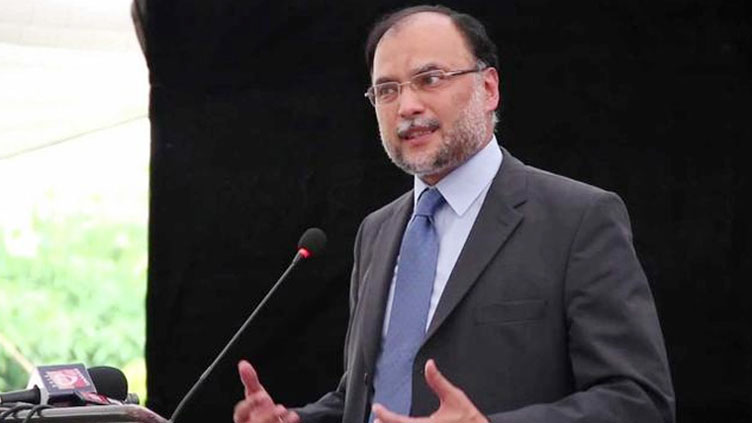
ISLAMABAD (WS News) – Minister for Planning, Development and Special Initiatives Professor Ahsan Iqbal on Wednesday proposed a multi-pronged strategy, aligning the GSP-Plus programme with the 5Es framework to get export-led economic growth and secure a prosperous future for Pakistan.
“The GSP-plus programme represents more than just trade preferences. It is a roadmap for sustainable development and good governance. By aligning it with the 5Es framework, we can unlock the true potential of export-led growth, empower our citizens and secure a prosperous future for Pakistan,” he said.
The minister was speaking as the guest speaker at a conference titled “Promoting Good Governance through Trade – Leveraging through GSP+,” organized by Fredrick Naumann Foundation.
Addressing the gathering, Ahsan Iqbal called for seizing the opportunity to strengthen governance and build resilience and position Pakistan as a globally competitive economy. “Together we can ensure that trade becomes not only a driver of economic prosperity but also a catalyst for equity, transparency and sustainability,” he added.
Despite the successes, he said challenges remained, adding weak enforcement of laws, low diversification of exports and environmental vulnerabilities needed immediate attention to maximize the benefits of GSP-Plus and align with 5Es framework – Exports, E-Pakistan, Environment and Climate Change, Energy and Infrastructure, Equity and Empowerment.Pakistan’s cuisine
Elaborating his proposed strategy, the minister suggested establishing export diversification centers with incentives for green technologies and high-value products.
He asked for setting up a National Compliance Task Force to oversee GSP-plus implementation and address gaps in governance on permanent/quarterly basis. “I hope this task force will be set up soon and with this we can have a permanent institutional mechanism”, he added.
Besides, the minister called for strengthening public-private partnership to modernize industries, enhance skills and adopt innovation. He proposed investing in export-oriented energy projects to ensure affordable and reliable energy for exporters and leveraging digitization for enhanced transparency in trade practices and reduce inefficiencies.
The planning minister said trade and governance were deeply interconnected; and through deliberated efforts. “We can harness this relationship to derive sustainable development and enhance transparency and uplift lives of millions of Pakistanis”, he said.
The GSP+ programme introduced in 2014, he said, had been a cornerstone of Pakistan’s export strategy, enabling duty free or reduced tariff and access to European Union, a market of over 500 million consumers.
Over the past decade, he said Pakistan’s exports to EU had grown by more than 100 per cent reaching almost up to $10 billion with trade volume of textile and apparel sectors.
“GSP-plus is a very important mechanism for Pakistan because it helps Pakistan mitigate its climate change vulnerability. Instruments like this have really helped Pakistan to mitigate the effects of climate disaster we faced in 2022 and feared in future,” he said
This preferential access was more than an economic boost, Ahsan Iqbal said, as it reflected a partnership based on shared values, human rights, labour standards, environmental protection and good governance.
“By demonstrating our commitment to the 27 international conventions under the GSP-plus framework, Pakistan has positioned itself as a responsible and competitive global partner”, he said.
At the heart of Pakistan’s development vision, he said, was the 5Es framework, Exports, E-Pakistan, Environment and Climate Change, Energy and Infrastructure, Equity and Empowerment. “Among these pillars, export-led growth is our top priority and the GSP-plus schemes serve as vital drivers of this strategy”, he maintained.
The Planning minister said the GSP-plus had enabled Pakistan to diversify its trade portfolio and enter new markets. “For exports to the EU accounted for nearly 33% our total exports in 2023 and this access has directly created millions of jobs, particularly in text, leather and agro-industries”, he added.
However, he said the potential was even greater to achieve the export-led growth target of $60 billion by 2030, adding “We must capitalize on GSP plus by moving up the value chains, producing high-end garments, sustainable goods and technology-driven products.”
“The GSP-s aligns with our digital vision where smart supply chains, e-commerce platforms and digital compliance mechanisms enable faster, transparent and more competitive exports,” he highlighted.
Ahsan Iqbal said environmental sustainability was a core focus of the GSP-plus conventions, from reducing industrial emissions to investing in green technologies. “Compliance with these standards enhances our global reputation and aligns with our broader commitment to combat climate change under our future Pakistan Vision 2047, which is under development,” he remarked.



